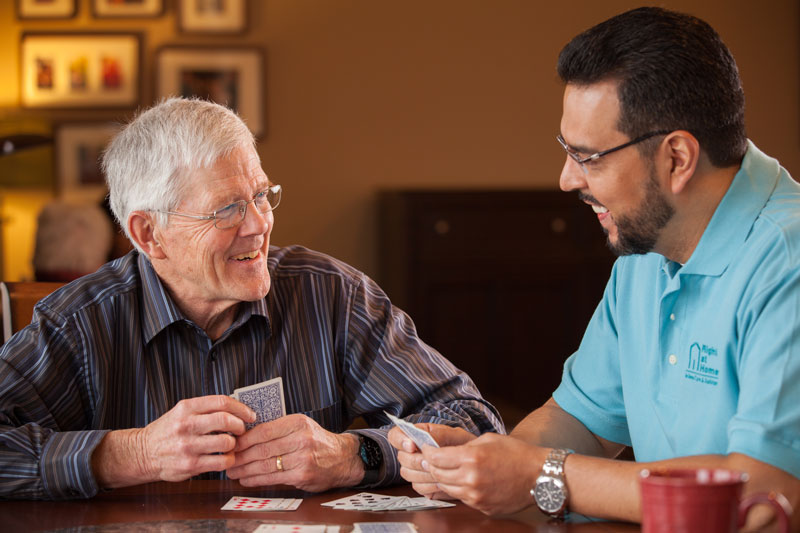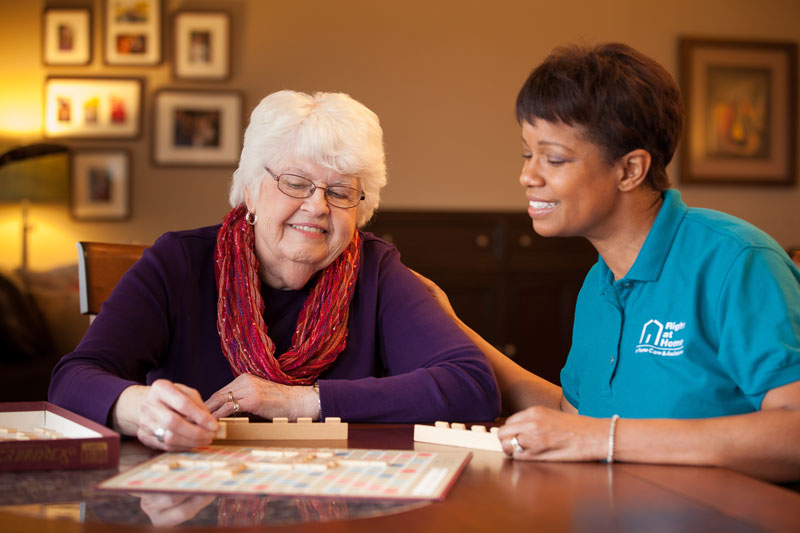When an older loved one or adult with a disability needs caring support at home, it can feel daunting to know which professional care services are best. Who can help with bathing and meals? Is a registered nurse needed for wound care? Can hospice care happen at home?
The Global Coalition on Aging and the Home Care Association of America state that almost 70% of Americans who turn age 65 will need assistance at some point to care for themselves. These senior care industry leaders also report that "already 40% of adults aged 65+ need assistance with daily living activities."1 The fast-growing care needs of the country's increasingly older population can leave care recipients and their families confused over in-home care options. The complexity of nonmedical and medical services available also may jeopardize a loved one from getting the timely and attentive care they need.
To help simplify the professional in-home care choices, Lorraine Grote Johnson, Director of Care Quality at Right at Home, a leading in-home care agency, notes that it is important to understand the differences between home care and home healthcare. Grote Johnson, a registered nurse for more than 35 years in both hospital and home settings, gives the following overview of common care services available in the home.
Home Care
In-home caregivers are the extra hand to provide personalized support to a loved one in their own familiar home surroundings. Home care can be part time, full time or live-in assistance ranging from light housekeeping and meal preparation to personal grooming and toileting. At-home caregivers can provide care services such as being a companion who helps write the grandchildren to driving the care client to medical appointments and to complete errands.
Home care can include specialized support for people living with a serious illness or transitioning toward death. Home care focuses on comfort and reduced stress for an ill loved one and balanced overall health for the patient and family members. Home care can also serve those with chronic diseases such as cancer, congestive heart failure, kidney disease and Alzheimer's. Home care allows a loved one to stay safe and independent at home as long as possible. Most at-home caregiving services are covered through private pay.
Home Healthcare
Home healthcare is skilled nursing care that is prescribed and directed by a physician and supervised by a registered nurse. Home healthcare is suited for complex health issues that require a higher level of medical assistance, or when a loved one is recovering from an injury or recent illness. A professional skilled nursing team can accommodate a client's numerous medical care situations such as monitoring vital signs, medication setup and management, dressing changes, and continence care.
Hospice Care
Hospice or end-of-life care is a type of palliative care, but the ailing person is no longer seeking curative treatment. The aim of hospice care is to extend comfort, peace and dignity to individuals in the dying process. Hospice programs also support a patient's family with counseling and bereavement care. Hospice teams of doctors, nurses, social workers, chaplains and other caregivers provide care in patients' homes or at a hospital or in-patient care facility.
Tips for Choosing At-Home Care
Because of the quickly expanding number of at-home services on the market today, Ryan Naegele, Owner of Right at Home of Chattanooga advises those in need of care and their families to consider the following tips for choosing at-home care:
- Select services only from a professional, licensed agency. Make sure you see actual proof of certification and licensing for the agency.
- Be certain that the caregiver who works with your loved one is insured and bonded.
- Get a detailed care plan or treatment plan upfront. Ask about goals of the suggested services.
- Review the caregiver's qualifications, experience and amount of supervision on the job.
- Discuss all financial costs and evaluate options for saving money on home care, including long-term care insurance, Veterans Aid and Attendance benefits, etc.
Availability of qualified at-home services varies by locales across the country, so Naegele recommends reviewing at-home agencies online, then visiting with the agencies in person. "Be sure to check references of the in-home agency candidates and their specific caregivers," Naegele explained. "Talk to others in the community who are familiar with the agencies and their reputations. In getting the best care possible for your loved one, every question and concern matters."
Right at Home of Chattanooga is a locally owned and operated home care agency.
FOR MORE INFORMATION
Call 423-803-2898, email at info@rahcha.com, or visit us online at www.rahcha.com.

